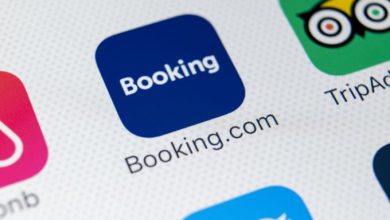
Agoda under fire again
A year after online booking giant Agoda was accused of allegedly running ‘bait and switch’-style promotions in Australia, it continues to draw the ire of local accommodation managers.
Responding to one of our articles on Agoda’s advertising practises, AccomNews reader ‘Stephen M’ warned others to avoid the OTA, a Singapore-based subsidiary of Booking Holdings.
“We manage a number of properties and were getting a few Agoda bookings via Booking.com,” Stephen wrote on our website.
“We thought a direct listing for one of our properties might be worthwhile, but quickly reversed that decision.
“Whether they have a direct listing or are reselling Booking.com availability, there are no end of problems for both the guest and the property. The main problems with this company are:
“# Guests have no way of contacting them. They ignore emails and are impossible to call.
“# They do not provide properties with ANY guest contact details. No phone number or email address. In fact they actively redact any attempt to share contact details via the messaging platforms. This makes servicing the booking impossible, especially if the property provides self-check-in, is awaiting payment or is trying to establish Covid tracing details.
“# They often discount rates below agreed prices, thereby hijacking the Google hotel listing and stealing direct bookings. This from a company that insists on price parity.
“# They often override cancellation terms. Putting more stringent terms in place than the Booking.com listing being resold. Agoda pockets the difference in the case of cancellation. In one case my first night cancellation was sold as non-refundable.
“# Booking.com are not interested in addressing any issues with Agoda bookings, even though they have the same parent company.’’
Stephen said he had asked Booking.com to stop Agoda using his listings, but they claimed that this was not possible.
Agoda has been approached for comment on these issues but is yet to respond.
Agoda was among six OTAs named by the UK’s Competition and Markets Authority in 2019 over so-called `sharp’ practices, including misleading discount claims. It joined Expedia, Booking.com, Hotels.com, ebookers, and Trivago in agreeing to comply with the UK regulatory authority’s transparency requirements and signing undertakings to stop any “pressure selling, false discount claims and hidden charges”.
Last year we highlighted how Agoda was allegedly running ‘bait and switch’-style advertising in Australia.
In an incident described by the Accommodation Association of Australia as “very, very concerning”, Agoda featured an advertisement for the Best Western Ipswich on The Guardian Australia website.
When the consumer clicked through, they were taken to another page advertising the listing at a more expensive price.
Agoda has been hard hit by the COVID crisis but says following a staff reduction of more than 25 per cent, the company is maintaining stable cash flow and can weather months, or even years, of travel restrictions thanks to the strength of domestic bookings.
In May last year the company laid off 1500 of its 5500 employees globally because of a sharp drop in hotel bookings, following global lockdowns.
Of its 4000 remaining employees, over 2200 work in Thailand.
Grantlee Kieza OAM has won three Queensland Media Awards, two Australian Sports Commission Awards and has been a finalist for the Walkley and News Awards and for the Harry Gordon Award for Australian sports journalist of the year. In 2019 he received the Medal of the Order of Australia for his writing. You can find more of his work in our AccomNews & Resort News print magazines.
He has written 22 acclaimed books, including bestsellers Hudson Fysh, The Kelly Hunters, Lawson, Banks, Macquarie, Banjo, Mrs Kelly, Monash, Sons of the Southern Cross and Bert Hinkler.








We dropped them years ago when they were selling our rooms cheaper than us. The vast majority of bookings were China and Malaysia and we all know how the majority of those guests leave the rooms. They refused to remove our listing on their site as we were supposedly bound by Booking.com and they would do nothing. The only way we could stop direct bookings was to disconnect them from our channel manager, they then have to go through booking.com.. They still to this day sell rooms to our property on their platform and the only way we know it is them is because we require an address from the guest and theirs defaults to Bangkok. I asked Booking.com and all they suggested was contacting guests directly for details, even though they know Agoda block direct contact, much like booking.com do with a lot of contact.
We have also “delisted” AGODA from our Channel Manager. They discounted our normal price to a ridiculous level and offered no customer service. Never again. Its a shame that their parent company would not take any action with their unethical behaviours.
I’ve talked to many of my Motel associates and most of them have deactivated Agoda.
How do you delist from Agoda? Booking.com refuses to do it and agoda refuses to take down the property, there are spam and slanderous comments on agoda that we cannot respond to and agoda wont take them down. Agoda also delays passing through booking.com messages to legitimate guests by a day and this means they dont get their checkin-codes.
Unfortunately the above comments from the reader comes with no real knowledge of the space. I’ve worked with Agoda across 15+ Properties for a number of years, they are easy to work with if you simply communicate with your account manager.
1. Coupons and discounts can be stopped, it’s as simple as asking them to turn it off.
2. Agoda can turn off the 3PI connection with booking.com with ease
3. Agoda doesn’t provide guest details as they work under a different set of privacy laws than Australia. They can provide all these details if you ask them for it, they just flick a switch in their system.
Now before people jump down my throat, yes they should just do all the above without asking, but at the same time Australia as a market isn’t the same size for them as other countries so their systems are a one size fits all approach which doesn’t really suit AU.
If you know how to approach the relationship from a positive way, Agoda is a great OTA to work with. Unfortunately the majority of people see the above and then get upset and don’t know the best way to work through it.
Chris, a total voice of reason and you are entirely correct. Far too often people approach the OTAs with anger and hatred and then wonder why they get nowhere.
Booking.com and Agoda work together and are sister companies, turning Agoda of simply means they take from Booking.com and continue to sell you.
For serviced apartments, simply ask for the contact details with the reason that you need to be able to contact the guests pre checkin and agoda will provide the details. They want their customers to be happy just like we do so will work with you.
Thanks for the background info on Agoda.
2 questions please: Do they still withhold payment?
And only reimburse the provider after the end of the month?
That’s why I stopped using them.
If they have changed their payment method it appears the way forward is to link with Agoda directly so you have more control.
Is that your suggestion?
Hi Keith
Agoda run a virtual card, payment on check in.
Yes I would definitely suggest working closely with them, you’ll find huge benefits
Thanks Chris
Check your reply as it is incorrect. Payment is on departure. Not check in. And the time frame to process is very short compared to others.
Hey Bebe
No it is not incorrect, the agreement my properties have with Agoda – the virtual card activates on day of arrival. You can ask for this also, just have to ask them 🙂
Chris,
The whole Agoda ethos is designed to screw the accommodation providers as much as possible.
1) The coupons shouldn’t happen in the first place. Ever. If they did they should ask permission, but they know every manager would say no. So they do it anyway hoping you won’t notice. They switch them off for a period of time hoping we wont check and then boom… they’re back!
2) The BDC connection is there to still get revenue for Agoda when properties disconnect. Again, just the attitude of screw them, we’ll list you no matter what.
3) The contact details are withheld to stop guests being told to book direct. You know it. I know it. We all know it. Don’t pretend there is some higher legal purpose. I should be able to tell that guest to call us without being stopped. Simple.
Hi Peter
Thats a big claim – why would their ethos be to screw their partners? They’re a business, they make business decisions. The reason why they take these actions is simple – they’re in a hyper competitive market place and want a competitive edge. Expedia takes the same actions with their adjustments also. Booking.com do so also nowadays. It’s a game now for these OTAs as they work to build back their marketshare, a lot of their bookings come from meta channels (1 in 3 in some cases), if an OTA has a few dollars off their rate on these channels they’ll likely win the booking.
I completely agree with you that they shouldnt happen in the first case however, many of these OTAs just do what they like, however if it can be turned off, I assure you it has happened with my properties.
Booking.com can limit their connection with Agoda, just needs to be pushed with the account manager from Bcom.
Even if you dont get the contact details, you can still flick the guest a message in the app and request that they contact directly. Their app blocks the sharing of phone numbers and emails much like Airbnb, however if you say ‘Please contact us directly at the hotel via phone for XYZ reason’ 9 times out of 10 they will contact you.
At the end of the day when you get their concerns sorted they are a great partner to work with, unfortunately for them their tactics are more public than their competitor. But rest assured they all do it, you might just not see their strategies in a domestic point of sale.
Chris,
You seem to have a very different relationship with Agoda than most of us.
I understand the value that otas can provide, and realise that all business has a cost associated with it, but as a small operator, I am just so sick of having the same conversation with Agoda and booking.com over their marketing practises.
We listed one property directly with Agoda to try and get a bit more control over these listing, but that’s when they started discounting to list their profile on the Google hotel listings.
There is no partnership, otherwise they would treat us completely differently.
Regards
Stephen M
(yes, the one that started all this)
Hi Stephen
Can I ask without sounding rude – have you tried to foster a relationship with your local rep? I’ve found once you get a good contact it becomes much easier as they understand the value in it. I’m a consultant like yourself and I have a wide variety of clients, but in the beginning I couldn’t get anything through with them (I even used to work for a competitor of theirs). After a bit of ground work the relationship fostered to a point where it’s a quick email asking for something to be done and it’s actioned.
In terms of OTAs they’re the most obliging when it comes to courtesy payouts and assistance with booking errors etc.
You can catch more flys with honey is all I’m saying.
Chris,
It’s a bit hard to foster a relationship when their answer is always no.
I have asked to have the booking.com listing removed on agoda – No.
I have asked for the discounting to stop – No.
I have asked for client details to be provided – No.
On a number of occassions guests have questioned the cancellation policy applied to their booking, but I have no idea what agoda has applied, as I no longer list with them. Their practises have negative effects on my business, the customer experience and our relationship with those customers.
I will yell from the treetop, to operators and guest – do not use Agoda.
You are right about the flys, but in my experience it’s not honey, it’s BS.
Regards
Stephen
Agoda are a huge problem for us. While Chris (above) mentions that you can contact the Agoda account manager and request that they do not discount, I have done this for our business, and it only works for a few months, until they “forget” and start discounting again.
We tried cancelling our Agoda account, and then they just take our availability from Booking.com.
I have relisted with them, solely because we can get a little more control over our listing if we list directly, but it is still a very painful relationship. A lot of work for very few bookings.
If it weren’t for booking.com refusing to cancel their connection to Agoda, I would cancel my Agoda listing in a heartbeat.
Warning, long message but this is a pandora box and below is the background and options for everyone in this thread:
We have stopped working directly with Agoda and recommended all our clients properties (40+) to do so.
The reasons are that:
– We do not need a direct agreement to be listed on Agoda and if you think about it Agoda discounts using a 15% commission margin. Therefore, by stopping the direct commission, and letting them feed off only via Booking.com, they only receive a clip of that margin (circa 8%); which in turns limit their ability to undercut pricing if they want to make an income (after paying their marketing, staff, etc,..). if they do, they shooting themselves in the foot. It is a way to be displayed on their site and minimise the instances they use couponing and unauthorised discounting. We reduced issues by at least 80% across our network.
– The market manager, whilst a nice person I enjoy having a drink with and share info and trends, cannot influence the global company decisions. If the company decision are to use couponing practices to compete at all cost with other distributors, my market manager friend cannot do anything about it without jumping hoops , which only stop the problem for a while.
– The caveat is that Agoda will also feeds off bedbanks and wholesalers in addition to Booking.com. Wholesalers and bedbanks have higher commission margins (typically 20-25%), and we found that by stopping our direct relationship with the main bedbank in Australia, (which mainly distributes online, in which we get bookings at 15% (why pay 20+%?), and by managing wholesalers only with smaller allotments, it did not allow Agoda and other non preferred OTAs to play with our pricing too much.
Finally, I must say that this issue is not regulatory, nor a law issue. ACCC has been trying to find a way to start litigation with OTAs and is having a hard to find pricing issues, except for this click bait marketing, which is difficult to recreate and prosecute. Mainly, OTA pricing practices are in line with ACCC mandate which is to ensure that competition exists between distributors (including the hotel websites) so the consumers get the best price. Indeed, as soon as a hotelier choose to distribute a net price to a distributor, the distributor is allowed by law to sell that product at any price above the net price (+$1 or +$50) and if they offer a lower price, it is in the best interest of the consumer, including me and you who all love a bargain. it is completely up to the distributor and this is why hoteliers offer “book direct” discounts under the nose of the OTAs. Now, in that sense, the hotelier is between a rock and hard place because it is the provider of the product but also a distributor of the product, competing with other distirbutors. a hotelier telling Agoda what price they should the net rate at is therefore trying to fix pricing with another distributor (a cartel) which is illegal under ACCC rules in Australia. Neverthless, a hotelier also has choices to cir-convent unreliable distributors like Agoda, which each have pros and cons and are described below:
– Stop working directly with the distributor, however, accept that the distributor can work with other distributors. They will just get a lower margin than you could give them if they were playing ball. Just let them know that. They are missing out.
– Stop working with the distributors distributing to the distributor. Telling them to stop working with the distributor is closely linked to “Third Line Forcing” practices, which also are illegal so it is “be careful” territories. Some will accept and some decline, just be prepared not to push the issue. Ask nicely and do not talk about price (price fixing), just mention that their brand does not align with yours.
– Play the trademarks and copyright card., by asking the OTA to stop using them else……. now, If lawyers get involves, you already lost more than you will gain….. I call this the no pros option. I just write so you know it is there.
– Work only with distributors providing gross rates, in which case the price distributed can only be marked up (by passing net rates). This is booking.com way of distributing rate whereby you distribute $100 and pay $15 commission after they stayed. This is the preferred option and also why Booking.com often has less propensity to provide unauthorised discounts, but also why most distributors do not work with gross rates and favour net rates and will say no when you ask because their system does not allow it (market manager vs company decisions). In fact out of all meaningful distributors, only Booking.com works with gross rates…..maybe they are the good guys after all?!
– Minimise the commission margins on net rates that an “offending” distributor can access, which we found was the best way to still benefit from the exposure provided by certain OTAs, whilst minimising the instances of price undercuts (as explained above). For this, you need to investigate which distributors feed other distributors and choose the best option to work with each of them, directly or indirectly. often, the market manager from each dstirbutor can assist with sharing their distribution network and complete your understanding of the hotel distribution landscape.
For that to happen you must talk to them, develop a relationship and play the company at its own game. As they say, keep your enemies closer, although I found that often, like Chris explained, they can actually become a lot more value. than we give them credit for.
Hi Matt, just reading all of this with interest. I have been trying to work out why some of my bookings through Agoda have been heavily discounted and was not aware that Agoda is an affiliate of Booking.com. I have contacted Booking.com and asked them to stop sharing my rates to their affiliates that are heavily discounting my rates, particularly in peak times where if these bookings had not been received through these discounted affiliates, hence blocking my availablity we would have most likely been able to caputre bookings from other OTA’s that are not carry out this discounting practise or even better from direct bookings. Being a very small property I think I may have to drop Agoda off altogether but then again it’s a double edge sword if Booking.com can feed my prices to Agoda and then they can just discount my prices through their sharing ability but at a lesser rate from what you are saying, have I got this right? Just a tad confused as to what to do here. Funny thing is Agoda don’t always discount heavily, we as accommodation properties don’t know when they are going to discount heavily like this but now that our peak season in happening, I am trying to work out what to do. Any suggestions would be appreciated.
if you delist with agoda , they will usually only take the rate straight from bdc , we delisted years ago and havent seen any significant discounting on there behalf
Delisting is challenging because there will always be another OTA who’s now in contract with “big OTA’s” to use property listing data – and all traffic data is redirected to the “big OTA”.